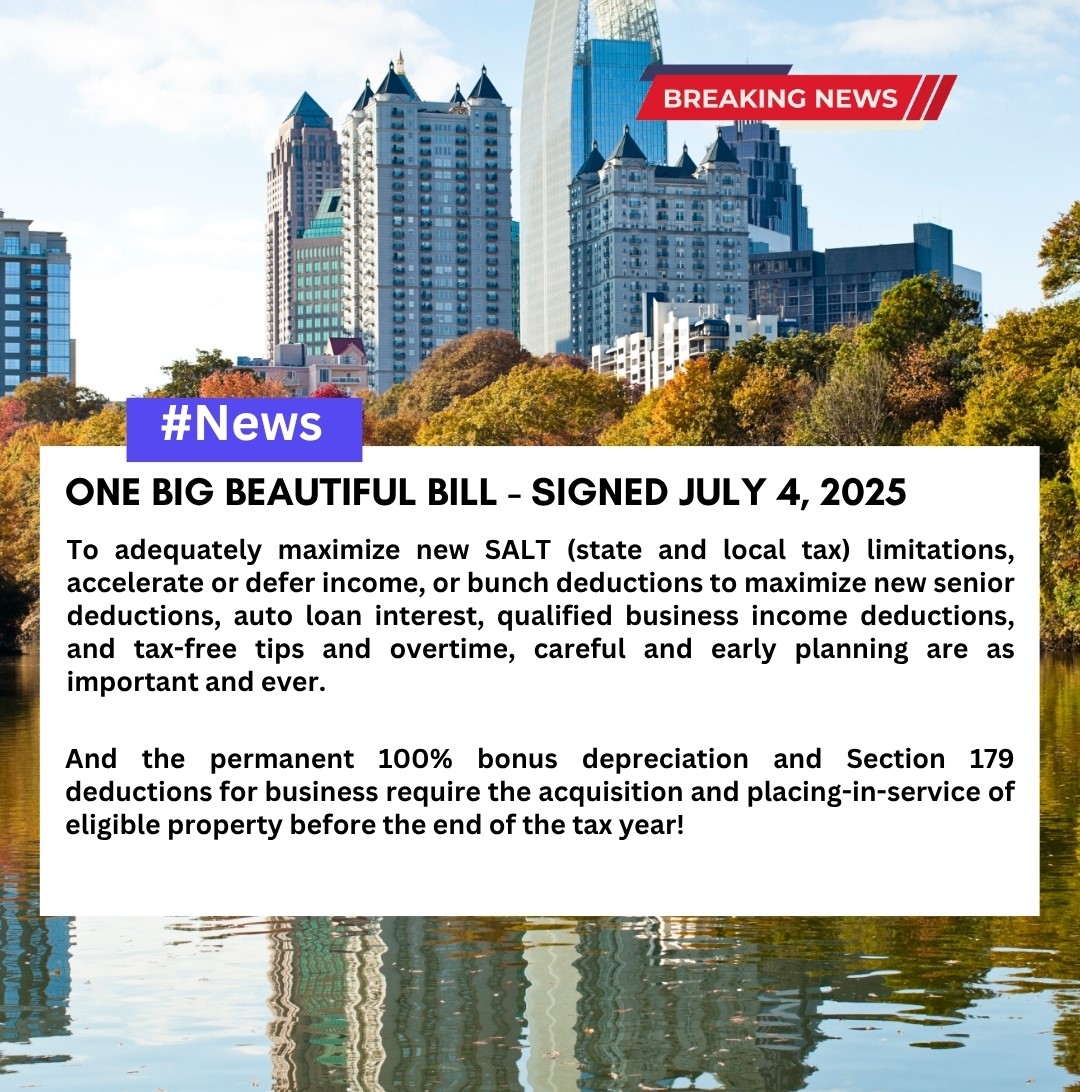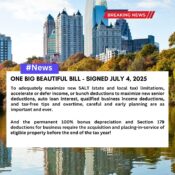
One Big Beautiful Bill: Major Tax Changes
The One Big Beautiful Bill was signed into law on July 4, 2025 and introduces sweeping tax changes affecting individuals, businesses, trusts, estates, and gifting strategies.
We detail everything below and want to be clear that planning will be critical. To adequately maximize new SALT (state and local tax) limitations, accelerate or defer income, or bunch deductions to maximize new senior deductions, auto loan interest, qualified business income deductions, and tax-free tips and overtime, careful and early planning are as important and ever.
And the permanent 100% bonus depreciation and Section 179 deductions for business require the acquisition and placing-in-service of eligible property before the end of the tax year!
✅ Individual Tax Highlights
- Tax Rates: The current rates from the 2017 tax law are now permanent, avoiding increases that would have pushed brackets to 15%, 25%, 28%, 33%, and 39.6%.
- Standard Deduction: Increased and permanently extended starting in 2025 to $15,750 (single), $23,625 (head of household), and $31,500 (married jointly), with annual inflation adjustments.
- Deduction for Seniors: Through 2028, individuals 65+ can deduct $6,000, reduced by 6% of income above $75,000 (single) or $150,000 (married).
- Child Tax Credit: Raised to $2,200 per child starting 2025, with permanent inflation adjustments and increases to the refundable portion.
- No Tax on Tips & Overtime: From 2025–2028, deductions of up to $25,000 (tips) and $12,500/$25,000 (overtime) are available, phasing out above $150,000 (single) or $300,000 (married).
- Auto Loan Interest Deduction: Deduct up to $10,000/year of interest on car loans for vehicles assembled in the U.S. (2025–2028), phasing out above $100,000 (single) or $200,000 (married).
- Mortgage Interest & PMI: The $750,000 mortgage interest deduction limit is made permanent. Starting in 2026, mortgage insurance premiums (PMI) qualify as deductible interest.
- Itemized Deductions Limitation: Reintroduces a modified “Pease Limitation” in 2026, reducing itemized deductions by 0.541% of the lesser of total itemized deductions or taxable income above the top bracket threshold (~$626,350).
- SALT (State and Local Tax) Deduction: Raised to $40,000 in 2025, $40,400 in 2026, then increases by 1% annually until 2030 before reverting to $10,000. Deductions above $500,000 income are reduced by 30% but not below $10,000.
- Dependent Care Benefits: Starting in 2026, the Dependent Care FSA limit increases to $7,500, and the maximum percentage of qualified expenses increases to 50%.
- 529 Plans: Expanded from 2026 to cover K-12 tuition/books and costs for postsecondary credentials.
- Trump Account: A new account for children under 18 allows annual contributions up to $5,000 (no deduction), with a pilot $1,000 credit for funding accounts for children born between 2025–2028.
- 1099-K Reporting: Threshold reverts to $20,000/200 transactions starting in 2025 for apps like Venmo, PayPal, etc.
- Termination of Green Credits: EV credits and energy-efficient home credits end after September 30 or December 31, 2025, depending on the credit.
✅ Business & Investment Provisions
- Qualified Business Income Deduction (§199A): Made permanent, with phaseout thresholds increased to $75,000 (single) and $150,000 (married) in 2026. Adds a $400 minimum deduction if qualified income exceeds $1,000.
- Bonus Depreciation & Section 179: 100% bonus depreciation is permanent for property placed in service on or after Jan 19, 2025. Section 179 expensing limit increases to $2.5 million, phasing out beyond $4 million.
- Qualified Production Property: 100% Depreciation deduction for original use Non Residential Real Property used as integral part of Production/Manufacturing business. However, the deduction is subject to automatic recapture if it ceases to be qualified (used in production/manufacturing) within 10 years of it being placed in service.
- Opportunity Zones: Makes opportunity zone incentives permanent starting in 2027, allowing continued capital gains tax deferral or elimination in qualified areas.
- Qualified Small Business Stock (QSBS): Holding period for full capital gains exclusion reduced from 5 years to a phased schedule beginning after 3 years, with increased asset qualification thresholds.
- Wagering Losses: Starting in 2026, deductions for gambling losses are limited to 90% of total losses, capped by gambling winnings.
✅ Trusts, Estates & Charitable Planning
- Estate & Gift Tax: Exemption rises from $13.99 million (2025) to $15 million (2026), indexed for inflation. The estate/gift tax rate remains at 40%.
- Charitable Deductions: Starting in 2026, up to $1,000 ($2,000 if married) of charitable contributions are deductible even if you take the standard deduction. For those that itemize, charitable deductions in excess of a 0.5% adjusted gross income (AGI) floor applies. Deductibility of cash contributions to qualified charities has been increased to 60% of AGI.
- Excise Tax on College Endowments: Tiered excise taxes (1.4%, 4%, 8%) apply based on student-adjusted endowment levels for private colleges and universities.
What You Should Do Now
✅ Evaluate your income, deductions, and timing of expenses to maximize new deductions and credits.
✅ Consider accelerating green energy or EV purchases before credits expire.
✅ Revisit your estate plan ahead of the increased exemption effective January 1, 2026.
✅ Explore opportunity zone investments and updated QSBS strategies.
Author
Recent Posts
Recent H&A Tax Controversy Wins
Changes Coming For Tax Refunds and Payments
One Big Beautiful Bill: Major Tax Changes
All Categories
Get a Free Consultation
Call us today to discuss your issue.



